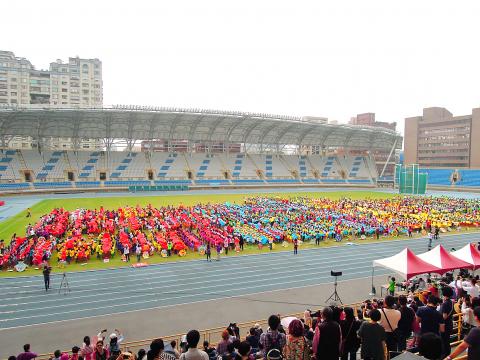The 2017 Universiade’s opening and closing ceremonies will not be held at the Taipei Dome — as originally planned — but will instead be moved to the Taipei Municipal Stadium, Taipei Mayor Ko Wen-je (柯文哲) said yesterday.
“If you take into account the time needed to prepare the interior, it cannot be guaranteed that the Taipei Dome project will be completed on time,” Ko said, adding that it would be easier to conduct city business if the Taipei Dome and the Universiade were “disconnected.”
The ceremonies were originally scheduled to be held in the Taipei Dome, but construction has fallen behind schedule amid conflict between the city government and contractor Farglory Group (遠雄集團) over safety and contract terms.

Photo: Liang Pei-chi, Taipei Times
Ko said the stadium had already been used for the 2009 Summer Deaflympics, adding that its smaller seating capacity was the only drawback.
The stadium can seat 20,000 people, half of the Taipei Dome’s seating capacity as specified in construction plans.
While the city would consider measures to increase the number of seats, it estimated that lost ticket sales from holding the ceremonies at the stadium would total NT$200 million (US$6.5 million), Ko said.
He added that the city’s backup plan called for the ceremonies to be moved to the Taipei Arena. Unlike the Taipei Dome, the Taipei Municipal Stadium cannot be covered to shield spectators from the elements.
The city’s decision came as the first round of arbitration talks between the Taipei City Government and Farglory fell apart at the last minute yesterday.
Shortly before the arbitration proceedings at the Taiwan Construction Arbitration Association were to begin, arbitration committee chair Yao Nai-jia (姚乃嘉) announced that Shih Yi-fang (施義芳), Farglory’s arbitration representative, had just called to announce her resignation, without specifying a reason.
Taipei Department of Legal Affairs division chief Shen Hsing-lin (沈杏霖) said the city government was “astonished” and “at a loss” over Shih’s resignation, while emphasizing the city government’s position that there are currently no grounds for arbitration.
She said the Taipei Dome contract calls for a negotiation committee of representatives appointed by the firm and city to be established if talks break down. Arbitration is only required if the “harmonization committee” is unable to resolve the dispute after three months, she said.
She said the city agreed to send a representative yesterday, because only the arbitration committee could deny Farglory’s demand for arbitration.
Farglory spokesman Jacky Yang (楊舜欽) said Shih had not contacted the firm to explain her resignation.
He added that Farglory had demanded arbitration in April only after the city failed to respond to a March request to establish a “harmonization committee.”
Under the city’s contract with Farglory, if either party is unsatisfied with the result of arbitration, they can take the dispute to court.
The Universiade is an international biannual college student competition billed as second only to the Olympics by its organizer, the International University Sports Federation.

The CIA has a message for Chinese government officials worried about their place in Chinese President Xi Jinping’s (習近平) government: Come work with us. The agency released two Mandarin-language videos on social media on Thursday inviting disgruntled officials to contact the CIA. The recruitment videos posted on YouTube and X racked up more than 5 million views combined in their first day. The outreach comes as CIA Director John Ratcliffe has vowed to boost the agency’s use of intelligence from human sources and its focus on China, which has recently targeted US officials with its own espionage operations. The videos are “aimed at

STEADFAST FRIEND: The bills encourage increased Taiwan-US engagement and address China’s distortion of UN Resolution 2758 to isolate Taiwan internationally The Presidential Office yesterday thanked the US House of Representatives for unanimously passing two Taiwan-related bills highlighting its solid support for Taiwan’s democracy and global participation, and for deepening bilateral relations. One of the bills, the Taiwan Assurance Implementation Act, requires the US Department of State to periodically review its guidelines for engagement with Taiwan, and report to the US Congress on the guidelines and plans to lift self-imposed limitations on US-Taiwan engagement. The other bill is the Taiwan International Solidarity Act, which clarifies that UN Resolution 2758 does not address the issue of the representation of Taiwan or its people in

US Indo-Pacific Commander Admiral Samuel Paparo on Friday expressed concern over the rate at which China is diversifying its military exercises, the Financial Times (FT) reported on Saturday. “The rates of change on the depth and breadth of their exercises is the one non-linear effect that I’ve seen in the last year that wakes me up at night or keeps me up at night,” Paparo was quoted by FT as saying while attending the annual Sedona Forum at the McCain Institute in Arizona. Paparo also expressed concern over the speed with which China was expanding its military. While the US

SHIFT: Taiwan’s better-than-expected first-quarter GDP and signs of weakness in the US have driven global capital back to emerging markets, the central bank head said The central bank yesterday blamed market speculation for the steep rise in the local currency, and urged exporters and financial institutions to stay calm and stop panic sell-offs to avoid hurting their own profitability. The nation’s top monetary policymaker said that it would step in, if necessary, to maintain order and stability in the foreign exchange market. The remarks came as the NT dollar yesterday closed up NT$0.919 to NT$30.145 against the US dollar in Taipei trading, after rising as high as NT$29.59 in intraday trading. The local currency has surged 5.85 percent against the greenback over the past two sessions, central